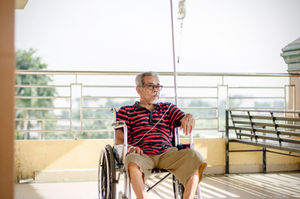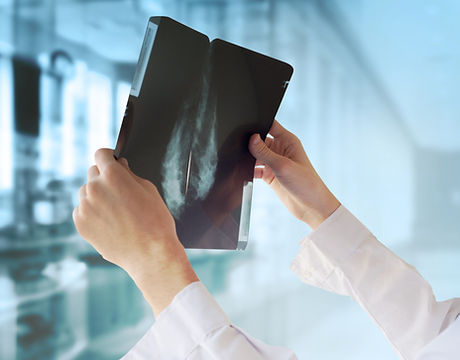My Experience with Ion Robotic Bronchoscopy: Advanced Lung Care That Makes a Difference
- Mark Esterle, MD
- Jun 27, 2025
- 5 min read

As a pulmonologist at Louisville Pulmonary Care practicing at Baptist Louisville, I'm excited to share with you one of the most significant advances I've witnessed in my career: Ion robotic bronchoscopy. This revolutionary technology has transformed how we diagnose lung conditions, and I want you to understand what this means for your care.
Throughout my years in pulmonary medicine, I've always been drawn to procedures that can make an immediate difference in my patients' lives. Interventional pulmonology procedures allow us to offer minimally invasive alternatives to traditional surgery, helping patients get answers and treatment with less discomfort and faster recovery times.
When I learned about Ion robotic bronchoscopy, I knew I had to become trained in this technology. The potential to reach areas of the lung that were previously difficult or impossible to access safely meant I could offer my patients better diagnostic accuracy and peace of mind.
What Ion Robotic Bronchoscopy Means for You
Let me explain this technology in simple terms. Imagine trying to thread a needle while your hands are shaking slightly – that's what traditional bronchoscopy can be like when we're trying to reach small nodules deep in your lungs. The Ion robotic system eliminates that challenge entirely.
How It Works
The Ion system uses an ultra-thin, flexible tube that I control with robotic precision. Think of it as having the steadiest hands possible, guided by advanced computer navigation. I can see exactly where I'm going in real-time and reach areas of your lung that would have been nearly impossible to access safely before.
To make our biopsies even more accurate, we combine the Ion robotic system with additional advanced technologies. We use CIOS (Cone-beam CT imaging) which gives us detailed, real-time 3D images of your lungs during the procedure. We also utilize both radial and linear probe ultrasound at the time of biopsy. These ultrasound probes allow me to confirm that we're positioned exactly where we need to be and can actually see the nodule before taking the tissue sample. This combination of technologies - robotic precision, real-time CT imaging, and ultrasound confirmation - gives us the highest possible accuracy for diagnosing your lung condition.
What This Means for Your Experience
When you come to me with a lung nodule that needs evaluation, here's what you can expect:
Before the Procedure: We'll review your CT scans together, and I'll explain exactly what we're looking for and how the robotic system will help us get there safely.
During the Procedure: You'll be comfortably sedated while I use the Ion system to navigate to the area of concern. The procedure typically takes 30-60 minutes, and the robotic precision means we're much more likely to get the tissue sample we need on the first try.
After the Procedure: Most of my patients go home the same day and can return to normal activities within a day or two. Compare this to traditional surgical biopsy, which might require a hospital stay and weeks of recovery.
Real Stories from My Practice
I've had patients tell me they were terrified when their primary care doctor found a "spot" on their lung. One patient, a 58-year-old teacher, came to me in tears because she was convinced she had lung cancer. Using Ion robotic bronchoscopy, I was able to safely biopsy her nodule and give her the wonderful news that it was benign. She was back to teaching within two days.
Another patient, a veteran in his 70s, had a nodule in a location that would have required major surgery to reach with traditional methods. The Ion system allowed me to get the sample we needed through a simple outpatient procedure. His tissue showed early-stage lung cancer, which we caught in time for successful treatment.
Working with Dr. Jewani and Our Team
I'm fortunate to work alongside my partner Dr. Sandeep Jewani, who shares my commitment to providing the most advanced care possible. We both completed specialized training in Ion robotic bronchoscopy, and we regularly collaborate on complex cases. Having two physicians trained in this technology means our patients at Baptist Louisville have access to this advanced care with flexible scheduling.
Our team approach means you're not just getting one doctor's opinion – you're benefiting from our combined expertise and experience with hundreds of robotic bronchoscopy procedures.
When Might You Need This Procedure?
You might be a candidate for Ion robotic bronchoscopy if:
Your CT scan shows a lung nodule that needs evaluation
Previous bronchoscopy attempts were unsuccessful
You have a nodule in a difficult-to-reach location
You want the most accurate diagnostic option with minimal invasiveness
What Sets Us Apart at Baptist Louisville
Choosing where to have your procedure matters. At Baptist Louisville, we've invested in the latest Ion robotic technology, but more importantly, we've invested in the training and expertise to use it effectively. I've performed hundreds of these procedures, and I continue to refine my technique with each case.
Our hospital provides the full support system you need – from advanced anesthesia care to immediate pathology services. If we do find something that needs treatment, our multidisciplinary team can coordinate your care seamlessly.
My Promise to You
When you come to me with lung concerns, I promise to:
Explain everything in terms you can understand
Use the most advanced, least invasive methods available
Treat you with the same care I would want for my own family
Be available to answer your questions throughout the process
Coordinate with your other doctors to ensure comprehensive care
Looking Forward
The field of interventional pulmonology continues to evolve, and I'm committed to staying at the forefront of these advances. The Ion robotic system represents just the beginning of what's possible when we combine technology with expertise and compassion.
If you have questions about a lung nodule or want to learn more about whether Ion robotic bronchoscopy might be right for you, I encourage you to discuss this with your doctor or contact our office at Louisville Pulmonary Care.
Questions I Often Hear
"Will it hurt?" You'll be comfortably sedated during the procedure, and most patients experience minimal discomfort afterward.
"How accurate is it?" The combination of robotic precision and advanced navigation makes this one of the most accurate methods available for diagnosing lung nodules.
"What if you find cancer?" If we do find cancer, catching it early through this minimally invasive method often means more treatment options and better outcomes.
"Is it safe?" Ion robotic bronchoscopy has an excellent safety profile, with lower complication rates than traditional surgical biopsy.
Remember, finding a lung nodule doesn't mean you have cancer – many nodules are benign. But getting an accurate diagnosis quickly and safely is always the best approach.
I'm here to help you navigate this journey with the most advanced tools available and the personalized care you deserve.
Dr. Mark Esterle practices pulmonary and critical care medicine at Baptist Louisville with Louisville Pulmonary Care. If you have questions about Ion robotic bronchoscopy or need evaluation of a lung nodule, please contact our office to schedule a consultation at 502-899-7377.










